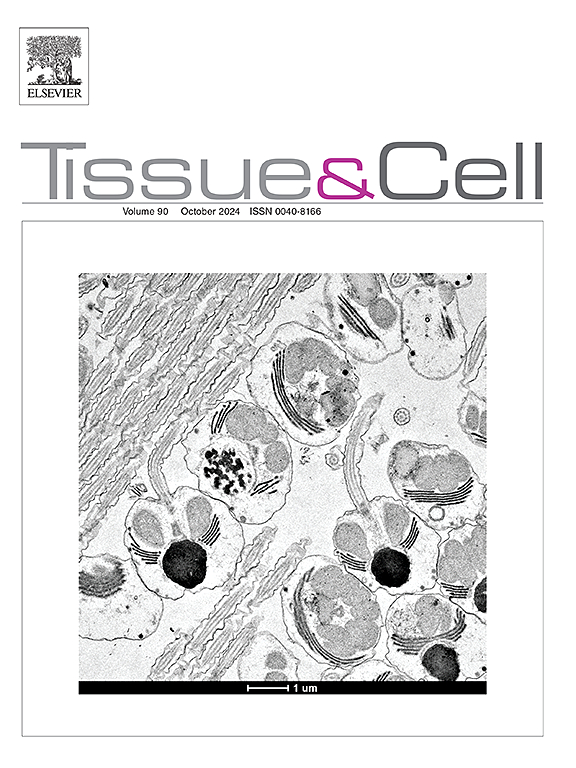组织学在组织工程学中的作用:脱细胞包皮支架复杂形态特征的意义。
IF 2.7
4区 生物学
Q1 ANATOMY & MORPHOLOGY
引用次数: 0
摘要
脱细胞是一种去除细胞的技术,可制备出空置的细胞外基质(ECM),并可将其重新植入患者特异性细胞,用于再生医学。组织学方法对方案标准化和疗效评估至关重要,而这正是制备此类生物支架所必需的。研究人员采集了年龄在三到十五岁的男性受试者(20 人)的前皮,并使用洗涤剂和酶制剂对其进行脱细胞处理。为了获得一种能在有效去除细胞和保留 ECM 之间达到最佳平衡的标准化方案,我们使用最基本的福尔马林固定石蜡包埋(FFPE)组织块对七种方案进行了评估,这些组织块被切片并用 HE、马森蓝三色素和橙皮苷染色。达到最佳效果后,我们使用扫描电子显微镜(SEM)和免疫组化(IHC)检测纤维连接蛋白和胶原蛋白 IV,进一步对支架进行形态学鉴定。事实证明,组织学是实现方案标准化、评估脱细胞功效和 ECM 保存情况的一种快速、相对简单且廉价的方法。通过正常组织学、扫描电子显微镜和 IHC 进行的形态学分析表明,两种明确的方案都能有效去除细胞,但同时不会损害 ECM 结构的完整性。通过正常组织学、IHC 和 SEM 对包皮衍生生物支架进行形态学表征,对于脱细胞方案的标准化、细胞去除效果的评估以及 ECM 保存效果的评估都具有不可替代的作用。本文章由计算机程序翻译,如有差异,请以英文原文为准。
The role of histology in tissue engineering: Significance of complex morphological characterization of decellularized foreskin scaffolds
Decellularization is a technique of cell removal that prepares vacant extracellular matrices (ECMs), which can be reseeded with patient-specific cells and used in regenerative medicine. Histological methods are vital for protocol standardization and efficacy assessment, which are necessary for preparing such bioscaffolds. Foreskins from male subjects (n=20) aged three to fifteen years were harvested and decellularized using detergent-based and enzyme-based protocols. To acquire a standardized protocol that would provide the optimal balance between effective cell removal and ECM preservation, a total of seven protocols were evaluated using the most basic formalin-fixed paraffin-embedded (FFPE) tissue blocks, which were sectioned and stained with HE, Masson’s blue trichrome and orcein. After achieving the optimal result, we further morphologically characterized the scaffolds using scanning electron microscopy (SEM) and immunohistochemical (IHC) detection of fibronectin and collagen IV. Histology proved to be a quick, relatively easy, and cheap method to achieve protocol standardization and assess decellularization efficacy and ECM preservation. Morphological analysis via normal histology, SEM, and IHC showed that both definitive protocols are effective in cell removal but, at the same time, don’t compromise the structural integrity of the ECM. Morphological characterization of foreskin-derived bioscaffolds via normal histology, IHC, and SEM is irreplaceable for standardizing decellularization protocols, assessing the efficacy of cell removal, and evaluating ECM preservation.
求助全文
通过发布文献求助,成功后即可免费获取论文全文。
去求助
来源期刊

Tissue & cell
医学-解剖学与形态学
CiteScore
3.90
自引率
0.00%
发文量
234
期刊介绍:
Tissue and Cell is devoted to original research on the organization of cells, subcellular and extracellular components at all levels, including the grouping and interrelations of cells in tissues and organs. The journal encourages submission of ultrastructural studies that provide novel insights into structure, function and physiology of cells and tissues, in health and disease. Bioengineering and stem cells studies focused on the description of morphological and/or histological data are also welcomed.
Studies investigating the effect of compounds and/or substances on structure of cells and tissues are generally outside the scope of this journal. For consideration, studies should contain a clear rationale on the use of (a) given substance(s), have a compelling morphological and structural focus and present novel incremental findings from previous literature.
 求助内容:
求助内容: 应助结果提醒方式:
应助结果提醒方式:


